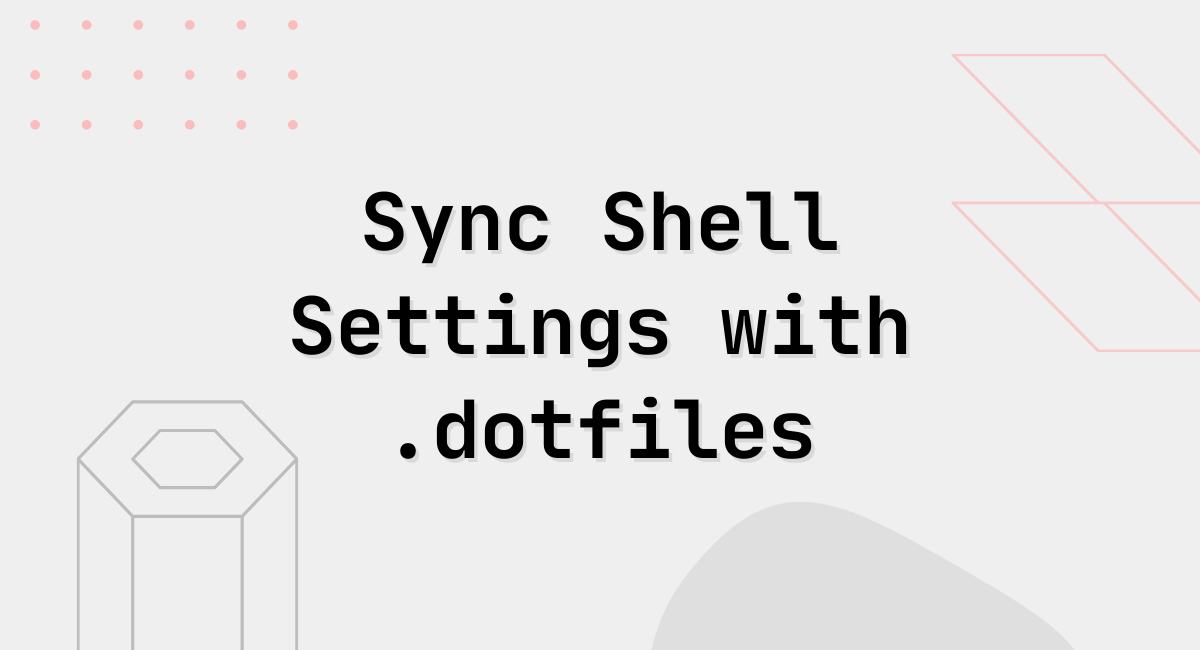dotfiles method to sync your command line configurations between machines

I want to talk about a common practice among developers who work on multiple machines or work on (many) servers. As developers, we spend a healthy amount of our time on the shell and work with command line tools. If you fit in this description, it is important to configure your shell to your own liking.
Then comes the question, of how to keep this configuration in sync between devices or servers. I will talk about the common method called dotfiles to store, push and pull the changes of these files (or collection of them). You may be familiar with this method but I’ll talk about my own setup after giving some context. I hope you can find bits and pieces of helpful tricks I implemented on my own version. But you can search dotfiles in github and find thousands of other developers to explore different flavors of personal configurations. Most developers make these configuration files public. You can find my dotfiles repo here: https://github.com/mfyz/dotfiles
Configuration Files
Most of the command line apps we use save their configuration in the user's home folder as a single configuration file or a folder with a dot prefix which makes the files/folders hidden by default file browsing apps and commands.
This makes the configuration of each tool, extremely portable. Basically copying this file between machines will give you exact replica of your tool configuration everywhere. Well, almost always. Some tools may require additional activation steps like installing vim plugins or planning multiple files.
How to collect them in one place?
The main trick of this method is to keep the original files under a single folder, generally
.dotfiles
in your home directory:
/home/myuser/.dotfiles/
Then link the original files to their final locations. Instead of manually linking them we’ll be using a utility for this.
Then this folder can be git managed and pushed to a remote repo. As I mentioned, a lot of developers make their dotenv configurations public. So you can push your dotfiles folder to github privately or publicly. If you are publicly pushing, you need to make sure there is no secure tokens included in your dotfiles. Read Security section below about this, that I’ll be talking about how to separate your secrets and store in a private repo that you can also make similar dotfiles-secrets repo and replication process between machines.
How to restore them to the right place in a new machine?
We’ll be using a utility called GNU Stow. Stow is a simple command that simply links files under a folder to your home directory. For example, if you have one or more configuration file for your zsh configuration like
.zshrc
file, you put it in a folder (can be any name) like “zsh”. Then running the command
stow zsh
anywhere will link the contents of zsh folder into the home directory.
You can collect all apps configurations in different folders under your .dotfiles folder. Then run stow for each folder. Or instead automate it something like:
for d in $(ls -d */ | cut -f1 -d '/' | grep -v '^_');
do
( stow "$d" )
done
Further more, you can automate the whole installation steps:
clone the github repo, so you have local copy
install gnu stow using the operating system’s package manager
walk all directories and run stow command that will link files to the root folder.
The final installation script will look like this:
#!/bin/bash
if [[ -e /etc/debian_version ]]; then
OS=debian
elif [[ "$OSTYPE" == "darwin"* ]]; then
OS=macos
elif ! command -v stow >/dev/null 2>&1; then
OS=notfound
else
echo "Please install stow manually then try again."
exit
fi
if [[ "$OS" = 'debian' ]]; then
sudo apt-get install -y stow
elif [[ "$OS" = 'macos' ]]; then
brew install stow
fi
git clone <https://github.com/mfyz/dotfiles.git> ~/.dotfiles
cd ~/.dotfiles || exit
for d in $(ls -d */ | cut -f1 -d '/' | grep -v '^_');
do
( stow "$d" )
done
echo 'Congrats, you are done, Enjoy!'
Securing your secrets
It’s very important NOT to push your secrets/tokens that generally make its way to rc files like .zshrc, or .bashrc. Instead, we will be moving all token/secret export commands to a separate file and repository that you can privately push and sync between machines with a similar method.
I’ve been using the name dotfiles-secrets for my repo and the name of the script.
The way it works is simply to put a folder
.dotfiles-secrets
then place all exports of tokens and secrets to a shell file called
secrets.sh
and push that to a separate private repo. Then git clone that repo manually to your home folder.
In my regular .dotfiles repo, my shell rc file (I use zsh, therefore it is
.zshrc
file for me), we have the following block that checks the
.dotfiles-secrets/secrets.sh
file and executes if the file exists.
# secrets
SECRETS_FILE="$HOME/.dotfiles-secret/secrets.sh"
if test -f "$SECRETS_FILE"; then
source $SECRETS_FILE
fi
This way, we gracefully do not give any error if you only want to clone the configuration files and not have your secrets.
This post was first published on my personal blog: https://mfyz.com/dotfiles-method-to-sync-your-command-line-configurations-between-machines/